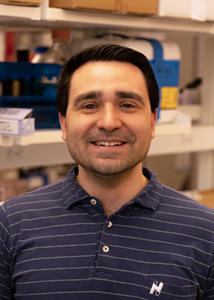
Investigator:
Matthew Keeney, PhD
Name of Institution:
Brigham and Women’s Hospital, Inc
Project Title:
Dissecting the Impact of PD-relevant Stressors on RNA-binding Protein Biology in Tractable iPSC Synucleinopathy Models
The effects of Parkinson’s disease–related environmental stressors on alpha synuclein-mediated RNA processing
Investigator Bio:
Dr. Keeney is a postdoctoral research fellow under the tutelage of Vikram Khurana, MD, PhD, at the Ann Romney Center for Neurologic Diseases, Mass General Brigham, and Harvard Medical School. He earned his PhD in Molecular Pharmacology from the University of Pittsburgh School of Medicine under the mentorship of J. Timothy Greenamyre, MD, PhD. During his PhD training, he focused on elucidating the mechanisms underlying LRRK2 kinase activity and its downstream cellular effects in Parkinson’s disease (PD). Now he is examining if alpha-synuclein (aSyn) serves as a potential stress response protein that alters gene regulation by perturbing RNA-binding proteins (RBPs), RNA metabolism, and the impact PD-relevant stressors (environmental toxicants, viruses, and PFFs) have on this system. The overarching goal of his work is to decipher cellular mechanisms that could identify therapeutic targets.
Objectives/Background:
Accumulation of a protein called alpha-Synuclein (aSyn) is a key feature of PD and mutations in aSyn link it directly to the disease. Our lab discovered that aSyn interacts with RNA binding Proteins (RBPs), which help control how genes are utilized.
Previously, we focused on aSyn interaction with RBPs involved in P-bodies which are crucial for regulating messenger RNA (mRNA), which acts like a set of instructions for making proteins in cells. This work focuses on investigating if PD-related harmful chemicals in the environment and viruses impair P-bodies and aSyn’s interaction with other RBPs such as XRN1, an RBP that chews up mRNAs. A consequence of such RBP impairment is the buildup of certain RNA molecules which can turn on the body’s immune response. We will investigate if these events are altered because of aSyn accumulation. This project seeks to establish a functional link between PD-related stressors, a-Syn, and RBPs, which in turn can lead to dysregulated gene expression and immune activation.
Methods/Design:
We will use stem-cell derived neurons that our lab engineered to express aSyn at similar levels observed in PD post-mortem human brain tissue. A CRISPR based tool will allow us to turn certain genes on or off, such as those involved with RBPs or aSyn. To assess P-bodies and the interaction between aSyn and a specific RBP under different PD-relevant stress conditions, special lab tests and advanced microscopes will be used to understand how these proteins interact inside the cells. As a complementary approach, other lab tests that detect how proteins interact will be used to assess these specific interactions. Using these neurons, it will be determined if changes in different aspects of RNA biology (mRNA stabilization, double-stranded RNA) can be attributed to aSyn function. Importantly, these findings will be validated in human post-mortem brain tissue from PD patients to provide disease relevancy.
Relevance to Diagnosis/Treatment of Parkinson’s Disease:
It is important to better understand how aSyn contributes to PD as this will lead to the identification of new therapeutic strategies for targeting aSyn-related pathways in PD. The work will provide evidence if PD-relevant stressors lead to altered interactions between aSyn and a network of RBPs, leading to disrupted RNAs and abnormal immune responses. If successful, these results will provide new protein or RNA processes that medicines could target for PD.
